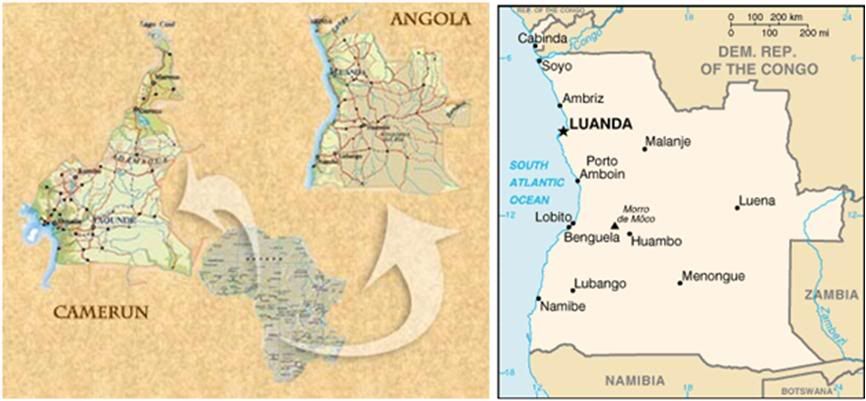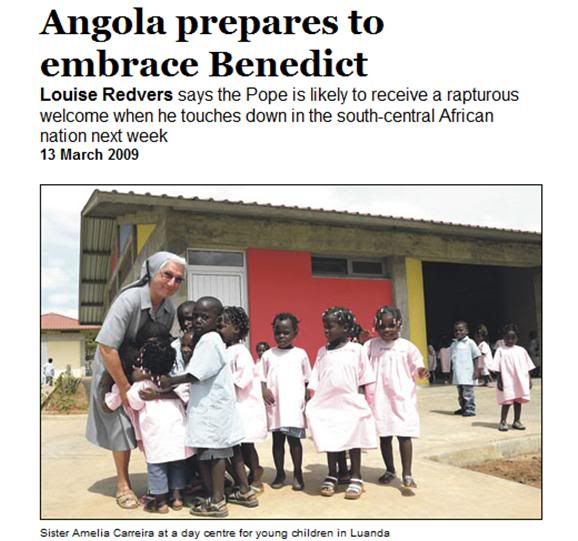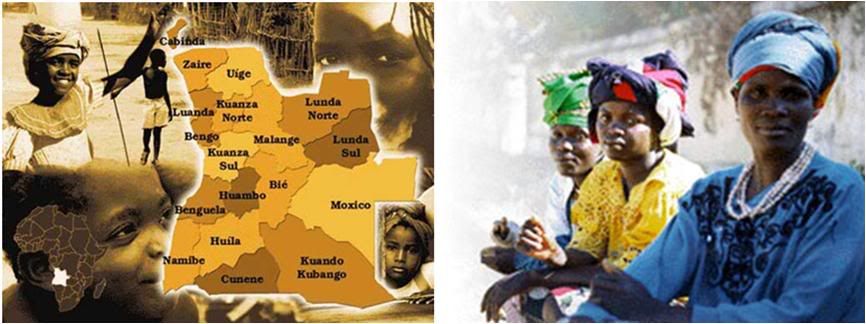 Angolan bishop considers
Angolan bishop considers
Pope's visit incomparable


Luanda, March 13 – The Angolan Bishop, Filomeno Vieira Dias, on Friday in Luanda, considered the visit of his Holiness Pope Benedict XVI to Angola as an unmatched and important opportunity for Angolans to strengthen, before the world, their image of special and united people.
Speaking at a press conference, held to assess the activities of the commission tasked with welcoming the Pope Benedict XVI, Bishop Filomeno Vieira Dias indicated that it is very important since it is about someone who is responsible for guaranteeing union among Christian communities.
The visit of his Holiness, stressed Bishop Vieira, will provide moments of collective reflection on various issues, particularly in terms of social matters. “The visit of Pope Benedict XVI, for the Catholic Church, signifies that Angola is prepared to host big social projects”, he said.
Expected to arrive in the country on March 20, the Pope will meet on the same day with the head of State José Eduardo dos Santos and with members of civilian society and political parties.


Every Saturday a group of women gather outside the Church of Our Lady of Nazareth in downtown Luanda dressed in a uniform of brightly-coloured headscarves, sarongs and white T-shirts and armed with traditional brooms made of sticks.
They collect water in large buckets which they carry on their heads before dousing the paving slabs outside the church and scrubbing, their bare feet covered in soap suds.
"The church must be cleaned," one elderly woman told me, stooping wearily as she brushed fiercely at the ground. "It is our duty and we come every Saturday to do this."
Another with a child tied to her back added: "The Church is our life, it gives us strength and it keeps us safe and in peace."
For the women in groups like this one, which number hundreds in Angola where more than 55 per cent of the population is Catholic, the visit of Pope Benedict XVI is an important confirmation of their faith.
Fernanda Amelia da Costa, 51, remembers shaking the hand of the late John Paul II when he visited Angola in 1992, and she spoke excitedly about Benedict's imminent arrival.
"I remember it like it was yesterday," the grandmother of 10 said, "I was working in the hospital and he came to see us there and that is when he took my hand. It made me so happy and I will never forget that moment.
"Knowing that the Pope is coming to see us here in Angola gives us much happiness because we know he will come in peace and bring affection and support to us all."
Angola's relationship with Catholicism dates back more than 500 years and celebrating this anniversary is another reason for Benedict's visit.
A lot has happened to Angola in those 500 years however: centuries of Portuguese colonial rule, a long and cruel slave trade, a bloody liberation struggle and then three decades of bitter civil war which claimed half a million lives and displaced many more.
John Paul visited Angola in 1992, during a brief ceasefire, but fighting resumed soon afterwards and peace only came to the southern African country in 2002.
Since then, however, Angola has seen its fortunes begin to change.
Oil- and diamond-rich, it has been one of the world's fastest-growing economies, and last September the country held a peaceful and credible legislative election (won overwhelmingly by the MPLA - the Popular Movement for the Liberation of Angola).
The Catholic Church has been with Angola through each twist and turn of its long journey, notably leading the humanitarian aid effort during the war and then playing an active role in the peace movement and encouraging dialogue between the different sides.
Now, in peace time, the Church continues to play a much-needed pastoral role: two-thirds of Angolans lives on less than two dollars a day, 10.5 million have no access to sanitation and one in four children die before their fifth birthday.
While the government is starting to address the country's social needs, much support is still provided at grassroots level by the Church, from orphanages to schools to HIV and Aids programmes.
Sister Amelia Carreira, a member of the Hospitable Franciscan Sisters of the Immaculate Conception, helps run a centre in a Luanda suburb, giving food, play and lessons to over 100 children between six months and five-years-old who would otherwise be left at home by working mothers.
"The war changed a lot of things here," she said, "And people are still trying to recover from that, the many social problems still need healing."
But while the Church continues this pastoral duty, it has not silenced the critical voice it found in the peace movement and Radio Ecclesia is widely acknowledged as Angola's most credible news source, carrying views from opposition parties and hosting open forum debates on social and human rights issues.
But the station continues to be restricted to transmission only within the capital, Luanda.
David Sogge, an independent development researcher who worked in Angola during the war years, said: "Luanda has a very progressive Catholic network and this has formed some of the most interesting parts of Angola's civil society and the majority of the human rights efforts.
"The fight to extend Ecclesia's transmission has been going on for years and reflects the government wanting to keep the progressive voice in Luanda where it is already strong, but not let it out into the provinces."
Previous attempts to extend the signal have been turned down, but Fr Mauricio Camuto, director of Radio Ecclesia, said Benedict's visit was an opportunity to change the minds of politicians.
"For me today, these attitudes are out of date," he said. "We are no longer in a time of controlled information when people are only able to hear the information the government wants them to hear."
While Radio Ecclesia will be at the forefront of the Church's agenda, the government will perhaps be hoping to use Benedict's visit to show its openness to the Catholic Church ahead of the forthcoming presidential election.
There was a similar display in 1992 for the visit of John Paul when the previously Marxist ruling MPLA used the papal tour as a way of legitimising itself in the eyes of Angolan Catholics.
Perhaps it's no coincidence that 17 years later Benedict's first appointment on his three-day tour is with President Jose Eduardo dos Santos, followed by an audience of politicians and diplomats.
Aside from this first day of officialdom, however, Benedict's programme is very much community-based, with Masses in neighbourhoods and football stadiums and meetings with Catholic youth and women's groups.
The Catholic Church, of course, knows how important Benedict's visit is to his dedicated flock, but they are perhaps also mindful of the increasing number of new religious movements springing up across Angola, particularly in urban slum areas, and will want the papal visit to renew interest in Catholicism.
The Brazilian Igreja Universal do Reino de Deus (Universal Church of the Kingdom of God, or UCKG) now has more than 200 churches across Angola and also growing in popularity is the Igreja de Nosso Senhor Jesus Cristo no Mundo (Church of our Jesus Christ in the World).
Aside, however, from these well-established congregations, there has also been a surge in traditional African faiths and some have been linked to child abuse and human sacrifice.
Last year 40 children had to be rescued from the Luanda premises of a group calling itself the Evangelical Church of Traditional Healing.
The youngsters, some just babies, had been made to fast, had their arms burned and perfume poured in their eyes, state media reported. Fatima Viegas, director of INAR (the National Institute for Religious Affairs), said the war and its legacy of poverty were to blame.
"Everybody needs to believe in something," she said, "And these churches appear offering solutions to problems when in fact they are just there to exploit."
Whatever Benedict makes of Angola his visit certainly marks Angola out as an important Catholic nation.
Nicole Walshe, Angola country representative for Trócaire, said: "I think the Pope's visit to Angola will give people confidence that Angola is now turning the corner, coming out of a difficult period into a new one of consolidation of peace, following on from elections last year.
"And more than anything," she added: "The people will appreciate being recognised by Rome and by the Vatican."
Angola prepares for the Pope:
Bishop describes hopes and expectations

VIANA, Angola, MARCH 6, 2009 (Zenit.org).- The bishop of Viana, Angola, said that Benedict XVI's scheduled visit to his country this month has inspired a flurry of preparations and hopes for political and personal peace.
Bishop Joaquim Ferreira Lopes affirmed this in an interview published Thursday by the Portuguese news agency Ecclesia, in which he spoke about the Pope's apostolic journey to Cameroon and Angola, planned for March 17-23.
The bishop mentioned that the Pope "will go to Cameroon to give the 'Instrumentum Laboris' for the next synod [on Africa] in October, and it is natural that he should visit another nation."
He continued, "In southern Africa, Angola occupies a privileged historical place, given that the Church started here at the end of the 15th century, and the whole epic of the Church south of the Equator passes through here, as a sign that no other nation has; no one can take this primacy away from Angola."
Bishop Lopes pointed out that, since the announcement of the papal visit last October, "the whole country began to prepare itself to receive the Pope."
The bishop referred especially to the question of security, stating that "these visits are made and prepared very precisely, in a joint endeavor between the country receiving the Pope and the Vatican."
He continued: "Changes have already been made in the Holy Father's program, precisely because some places did not offer total security; I am certain that everything will be all right, because the capability of the Angolan people in this area is very great."
Referring to the expenses of the Pope's visit, the prelate acknowledged that "it implies out of the ordinary expenses." He affirmed that the visit will have the support of the government and "all Christians are determined to contribute, according to their possibilities, from the financial point of view."
He said that the papal visit to the Christian community and the population in general "is of such an order that it justifies these expenses, which will not be exaggerated given that our country, despite being potentially wealthy, is poor in several aspects."
He added: "We believe it is worthwhile to spend the money; we will never regret it, because the good that will come from this papal visit will be extraordinary and will have an effect on the pacification of spirits, which is what we most want in Angola after signing the peace [agreement].
"Political peace is one thing, but social peace, personal peace and peace of hearts must be strengthened."
Angola is still struggling to recover from a 27-year civil war that just ended in 2002.
The occasion for the Pope's visit is the500th anniversary of Angola's evangelization.
THE COUNTRY AND ITS PEOPLE

Angola is situated on the Western coast of Southern Africa and was a Portuguese colony till 11 Noveeber 1975, when it won independence. It has an area of 1,246,700 km².

The country is divided into 18 provinces, and its capital city is Luanda. Its periphery comprises 4,837 kilometres, bordering on Congo Brazzaville, the Democratic Republic of the Congo (ex-Zaire), Zambia, and Namibia. Its coast, washed by the Atlantic Ocean, has 1,650 kilometres.
Luanda, Lobito and Namibe are its main ports. The countrys highest peak is Monte Moco (2,620 metres), situated in Huambo, with its main rivers being Kwanza, Zaire, Cunene and Cubango. Its currency is Kwanza (Kz).
The estimated number of inhabitants in 1995 was 11 million, with an estimated growth to 16 million by the year 2010. It was also estimated in 1995 that the population was distributed as follows: 49,3% (males) 50,7% (females). Out of that, 32% lived in urban areas and 53% being economically active. The population of Luanda alone was estimated in 1995 at 3 million inhabitants.
Angola's official language is Portuguese, but the country counts with various vernacular languages such as Kikongo, Kimbundo, Umbundu, Chokwe, Mbunda and Oxikwanyama. The population is predominantly Christian, with the Catholic religion being the most expanded one.
Basic facts about Angola from the CIA Factbook, which is updated to 2007:
ANGOLA
- Population 12.5 million, median age 18.
- Area slightly less than twice the size of Texas.
- 47% indigenous religions, 38% Catholic, 15% Protestant
- 67% literacy
- Fast-growing economy based on oil, which accounts for 85% of its Gross Domestic Product).
Member of OPEC, with oil reserves of 25 billion barrels, and daily oil production of 1.7 million barrels a day.
- GDP $7800 per capita.
- Angola is still recovering from the devastating effects of a 27-year civil war that ended in 2002.
- In 2003, 3.9% of the population had AIDS (240,000), with 21,000 deaths that year.
ABOUT THE CATHOLIC CHURCH
IN THE REPUBLIC OF ANGOLA
Information as of Dec. 31, 2007 from the Central Statistical Office of the Church.
Republic of Angola
Capital city: Luanda
Population: 15,473,000
Catholics: 8,600,000 (55.6 percent)
18 ecclesiastical circumscriptions
307 parishes
2,976 pastoral centres of other kinds.
27 bishops
794 priests
2,276 religious
5 lay members of secular institutes
30,934 catechists.
1,032 minor seminarians
1,236 major seminarians
481 Catholic schools (from kindergarten to universities)
226,798 students
Other institutions owned or operated by priests or religious:
23 hospitals
269 clinics
16 homes for the elderly or disabled
45 orphanages and nurseries
37 family counselling centres and other pro-life centres
28 centres for education and social rehabilitation
41 institutions of other kinds.
[Modificato da TERESA BENEDETTA 16/03/2009 00:53]